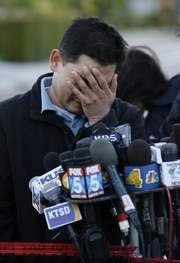Here a YouTube of Ron Paul's
second speech, and here's the text with extended remarks:

Mr. Speaker, I rise in opposition to this bill. It doesn't make a whole lot of sense. But I am concerned that we are narrowed down on a problem of the car industry, which is a significant problem, but we are dealing with $15 billion here. But if you look at the grand problem we have, it is much, much bigger, and it seems like we don't pay much attention to it.
The problems that we are facing today and the problems that we have been trying to solve in these last 6 months were predictable. It had been building for a good many years. We can date it back to 1971. We have had a financial bubble building, so there were many who predicted that the climax would be exactly as we are witnessing.
But we don't seem to want to go back and find out how financial bubbles form and why they burst. Instead, we just carry on doing the same old thing and never look back. We spend more money, we run up more debt, we print more money, and we think that is going to solve the problem that was created by spending too much money, running up debt, printing too much money. And here we are today, we are talking about tinkering on the edges without dealing with the big problem.
The Federal Reserve has literally created over $2 trillion here in the last several months, at least in obligations, and that is outside the realm of the Congress. We don't even audit the Federal Reserve. They create this money, and when the Fed Chairman comes before our committee and we ask, well, where did you dispose of this $2 trillion that you have created recently, he says well, it is not your business. That is not necessary. Under the law, he doesn't even have to tell us.
So this is how out of control our problem is. Sure, there is a lot of debt in the economy, and once a government or a corporation gets an excessive amount of debt, it is never paid for. So, yes, we can transfer the debt to others.
We are dealing with only finding victims. We cannot get rid of the debt, whether it is our national debt or whether it is corporate debt, but we have to put it on somebody else. We need to look at the cause of these bubbles, and it has to do with monetary policy and the Federal Reserve system.
Mr. Speaker, no one can deny that Congress bears much culpability for the current condition of the United States auto industry, and therefore Congress should act to help that industry. We should be repealing costly regulations we have imposed on domestic auto manufactures. Congress should also be considering legislation like H.R. 7273 and H.R. 7278, which reduces taxes on American consumers to make it easier for them to purchase American automobiles.
Unfortunately, instead of repealing regulations and cutting taxes, Congress is nationalizing the automakers by giving them access to $14 billion of taxpayer funds in return for giving the federal government control over the management of these firms. Mr. Speaker, the federal government has neither the competence nor the constitutional authority to tell private companies, such as automakers, how to run their businesses. Yet, the bailout proposal forces automobile manufacturers to submit their business plans for the approval of a federal ``car czar.'' This czar will not only have the authority to approve the automakers' restructuring plan, but will also monitor implementation of the plans. The czar will also be able to stop transactions that are ``inconsistent with the companies' long-term viability.'' Of course, the czar has the sole authority to determine what transactions are ``inconsistent with the companies' long-term viability.''
I would have thought that failed experiments with central planning and government control of business that wrought so much harm in the last century would have taught my colleagues the folly of making businesses obey politicians and bureaucrats instead of heeding the wishes of consumers, employees, and stockholders.
The alternative proposal is less costly to the taxpayer; therefore I will vote for it if offered as a motion to recommit. However, I am troubled that the proposal endorses the notion that the federal government should play both a financial and managerial role in restoring the American automobile industry. Mr. Speaker, it is a shame that we are not given a chance to vote for a true free-market approach; instead we are asked to choose between two types of government interference with the market.
Providing this $14 billion in loan guarantees will contribute to the already fragile economy by increasing the federal debt and thus creating either increased inflation or increased taxes. Mr. Speaker, I ask my colleagues to consider how many businesses will not be started, jobs will not be created, and consumer desires will remain unfulfilled because the resources to start those business and create those jobs were taken from the private sector for the auto bailout. I urge my colleagues to reject this unconstitutional bill that will further the growth of government and damage the American economy. Instead, Congress should help the American auto industry, and all American business, by cutting taxes and regulations.







































.jpg)




